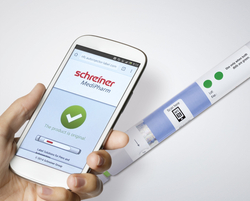 Mobile Authentication for Product and Brand Protection in the Pharmaceutical Industry
Mobile Authentication for Product and Brand Protection in the Pharmaceutical Industry
Digital technologies are playing an increasingly important role in pharmaceutical companies' anti-counterfeiting and tamper-protection strategies. This was the unanimous opinion of more than 30 international experts who recently engaged in an intensive exchange at Schreiner MediPharm's customer workshop on "Pharmaceutical Packaging Solutions to Improve Patient Safety." A wide range of measures serve to safeguard the pharmaceutical value chain. To authenticate pharmaceuticals, an active involvement of physicians, pharmacists, as well as patients, is particularly important. Innovative technologies, such as NFC and the BitSecure copy detection pattern for mobile authentication, offer unique opportunities.
The integration of NFC (Near Field Communication) technology into labels for pharmaceuticals is considered as a forward-thinking new development that adds high value. "Smart e-labels offer pharmaceutical companies a wealth of opportunities. In addition to possible applications such as patient interaction, automatic recognition of medications by injection systems or process optimization in internal logistics, they open up a wide variety of product and brand protection options," explains Ann L. Merchant, President of Schreiner MediPharm. NFC inlays enable contactless reading by smartphones and thus digital identification of pharmaceuticals. Customized solutions using password protection, signatures or encryption technologies offer high protection against attempted fraud, according to the respective threat scenario. The required inlays can be easily integrated into labels for medicine containers. Due to their thin and flexible construction, they inconspicuously blend into the existing design, and the NFC labels can simply be applied to the primary containers during the production process. Merchant sums up further advantages: "Due to the wide-spread use of NFC-capable smartphones, this form of identification incurs no costs for special readers and can be performed by anyone involved in the process at any time."
The popularity of smartphones – more than 1.5 billion are currently in use worldwide – also prompted the Competence Center Schreiner ProSecure to recently upgrade the BitSecure technology with a mobile authentication option and to develop a special application for smartphones. "It fulfills all the requirements of the pharmaceutical industry for marking original products. BitSecure marking is cost-efficient and extremely counterfeit-proof, as well as fast and easy to verify," explains Thomas Voelcker, Marketing and Business Development Director at the Competence Center Schreiner ProSecure. The BitSecure copy detection pattern uses a high-resolution, cloud-like printed image. Its delicate details are not discernible by the naked eye. If a counterfeiter tries to copy it, the image will suffer a loss in precision and optical details, and can thus be identified as a fake by means of the respective app. While the original print on the medicine pack or the pharmaceutical label is generated directly from a high-resolution digital file, an illegal copy is based on a printed image. The newly developed app features a complex software while offering intuitive usability. It allows users to read the digital copy detection patterns via their smartphones and lets them know within a few seconds whether the product is an original or a fake.




